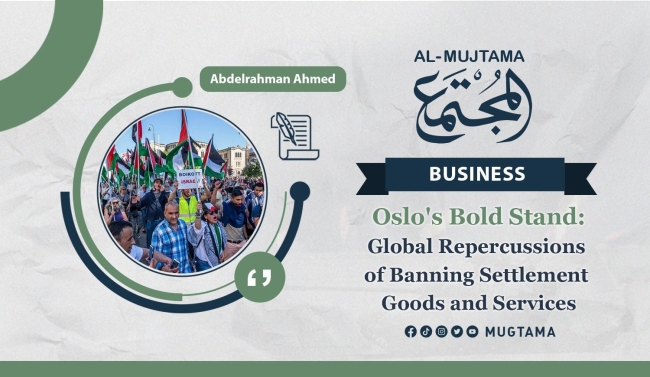Oslo's Bold Stand: Global Repercussions of Banning Settlement Goods and Services
The recent announcement by Oslo to ban the import of goods and services from companies directly or indirectly contributing to Israeli settlements marks a significant development in the international response to the Israeli-Palestinian conflict. This move aligns with a broader global trend of rejecting Israeli settlement policies and reflects the growing influence of the Boycott, Divestment, and Sanctions (BDS) movement. In this essay, we will explore the implications of Oslo's decision, its resonance with the BDS movement, and the broader international response to Israeli settlements.
Oslo's Ban on Settlement Goods:
Oslo's decision to ban the import of goods and services from companies involved in Israeli settlements is a clear denunciation of the blatant violation of international law. By taking this stance, Oslo joins a growing number of nations and entities that are willing to take concrete actions against Israel's settlement policies. The move sends a powerful message that the international community is no longer willing to turn a blind eye to the expansion of settlements in the occupied Palestinian territories.
The BDS Movement and Global Solidarity:
The BDS movement, led by the National Committee for the BDS in Palestine, has played a pivotal role in advocating for the isolation of Israel on the global stage. The movement calls for the cessation of trade, economic cooperation, and diplomatic ties with Israel until it complies with international law and respects the rights of the Palestinian people. Oslo's decision to ban settlement goods aligns with the objectives of the BDS movement, demonstrating a growing momentum for a unified global response to Israeli actions in the occupied territories.
Global Responses: Barcelona and Beyond:
Oslo's decision echoes the sentiments expressed by Barcelona earlier this year when the city council voted to freeze its twinning agreement with Tel Aviv and cut institutional ties with Israel. This move was a culmination of efforts by left-wing parties and the city's mayor, Ada Colau, reflecting a groundswell of support for the BDS movement. The decision by Barcelona and Oslo represents a trend where cities are taking a stand against Israeli policies, responding to the calls of their constituents and civil society to align their actions with international law.
The Role of Civil Society and Grassroots Movements:
The success of the BDS movement and the decisions made by cities like Oslo and Barcelona underscore the influential role that civil society and grassroots movements play in shaping international responses. Civil society, including trade unions, solidarity groups, and human rights organizations, has been instrumental in raising awareness about the plight of the Palestinian people and pressuring governments and institutions to take a principled stance against Israeli violations.
The Norwegian Government's Previous Actions:
Oslo's recent ban on settlement goods is not the first time the Norwegian government has taken steps to address the issue. In 2022, Norway declared that the "Made in Israel" label is only suitable for products originating from areas under Israeli control before June 4, 1967. This decision was a clear attempt to distinguish between products from Israel proper and those from the occupied territories, including the West Bank, East Jerusalem, and the Golan Heights. Oslo's consistent efforts to align its policies with international law demonstrate a commitment to upholding principles of justice and human rights.
International Implications:
The actions of Oslo and Barcelona send a ripple effect across the international community, prompting a reevaluation of relationships with Israel and a reconsideration of the economic and political consequences of supporting Israeli settlements. As more cities and nations take similar measures, Israel may find itself increasingly isolated on the global stage. This isolation, driven by a commitment to justice and international law, has the potential to create a more conducive environment for diplomatic efforts aimed at resolving the Israeli-Palestinian conflict.
Challenges and Controversies:
While the actions of Oslo and Barcelona have been widely praised by supporters of the BDS movement and advocates for Palestinian rights, they have not been without controversy. Critics argue that such measures may hinder dialogue and peace-building efforts. However, proponents argue that these actions are necessary to exert pressure on Israel to change its policies and engage in meaningful negotiations for a just and lasting peace.
In conclusion, Oslo's recent decision to ban the import of goods and services from companies involved in Israeli settlements reflects a broader international shift in attitudes toward the Israeli occupation. The alignment of Oslo's actions with the BDS movement and the parallel move by Barcelona signals a growing consensus among cities and nations to take a stand against Israeli settlement policies. The role of civil society and grassroots movements in shaping these responses cannot be overstated. Decisions like those made by Oslo and Barcelona contribute to a reevaluation of the global approach to achieving a just and lasting resolution.


